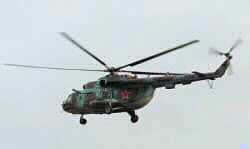HIGHLIGHTS: Moscow Insists Nationalist Fighters Disarm Before Talks can Begin||Informal Contacts Between the Two Sides Opened Last Wednesday & a Pro-Chechen Russian Deputy is to Meet Deposed Elected Chechen President Maskhadov Soon||First Official Talks Last November Were Inconclusive||Russian Public Opinion in Favour of Talks Despite Official Hardline||4,600 Russian Soldiers, 10,000-20,000 Civilians Killed Since Russian Troops Poured into Chechnya on October 1, 1999|| STORY: Recent contacts between Russian officials and Chechen nationalists do not reflect the position of the Kremlin which insists that the nationalist fighters must disarm before talks can begin, President Vladimir Putin's top spokesman on Chechnya said.
"Recent initiatives to set up talks, in Russia or abroad ... are private initiatives and their instigators do not express the views of Russian authorities," the Interfax news agency quoted Sergei Yastrzhembsky as saying.
Moscow's representative on human rights in Chechnya, Abdul Khakim Sultygov, said last Wednesday he had met 14 nationalist deputies elected to the republic's parliament in 1997, the first official contact with nationalists since inconclusive talks last November.
And a pro-Moscow Chechen deputy in the Russian lower house of parliament, Aslambek Aslakhanov, recently said he would soon meet in Switzerland with an envoy for Chechen deposed elected President Aslan Maskhadov, Akhmed Zakayev.
But Yastrzhembsky said the only Russian official mandated by President Vladimir Putin to engage in talks with Chechen nationalists was his envoy for southern Russia, Viktor Kazantsev.
Kazantsev met with Zakayev in Moscow last November but the talks were inconclusive, Yastrzhembsky noted.
The Kremlin is maintaining its official refusal to acknowledge Maskhadov's legitimacy as president -- despite his election in a January 1997 poll regarded as fair -- or to negotiate a special status for Chechnya, and is demanding that Chechen fighters lay down their weapons.
However, Russian public opinion has been coming round to the need for talks, with 60 percent now in favour, according to recent polls.
Interior Minister Boris Gryzlov, meanwhile, said a renewal of separatist activities has forced Moscow to again put off plans to shift control of the Caucasian republic from the elite FSB (ex-KGB) security service over to his ministry.
"As long as operations of localisation and liquidation of nationalist group leaders and active members have not been completed in Chechnya, it is not appropriate to transfer the direction of 'anti-terrorist operations' to the interior ministry," Interfax-AVN news agency quoted him as saying.
Federal forces quoted by the agency said 10 soldiers were killed and 44 wounded in skirmishes last week. Last Friday, at least one Russian soldier was killed when a helicopter crashed after coming under nationalist fire in Chechnya.
The Russian military quoted by ITAR-TASS also said troops had killed 13 Chechen fighters on Monday in separate skirmishes.
Since Russian troops poured into Chechnya on October 1, 1999 to put down what Moscow termed a terrorist campaign, more than 4,600 troops have died, according to official figures (though the Soldiers' Mothers group says the true figure may be three times as high), along with 10,000-20,000 civilians, according to the human rights group Memorial.
FSB forces took control over operations in Chechnya from the defence ministry in January 2001.
PHOTO CAPTION
Mi-8 helicopter flies over the Chechen capital Grozny, Russia, Wednesday, Sept. 18, 2002 in this file photo. A Russian Mi-8 helicopter crashed in Chechnya on Friday and at least 22 of the 24 people aboard survived when the helicopter fell into a river. The Mi-8 was carrying 21 Russian police and three crew members. (AP Photo/Musa Sadulaye
- Author:
& News Agencies - Section:
WORLD HEADLINES


 Home
Home Discover Islam
Discover Islam Quran Recitations
Quran Recitations Lectures
Lectures
 Fatwa
Fatwa Articles
Articles Fiqh
Fiqh E-Books
E-Books Boys & Girls
Boys & Girls  Hajj Rulings
Hajj Rulings Hajj Fatwas
Hajj Fatwas














